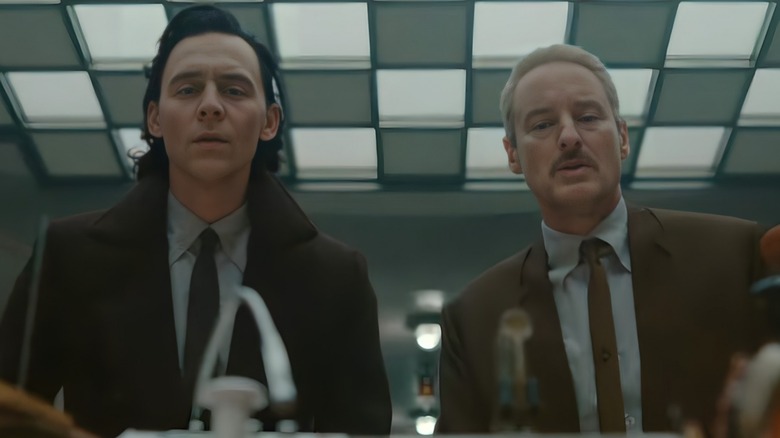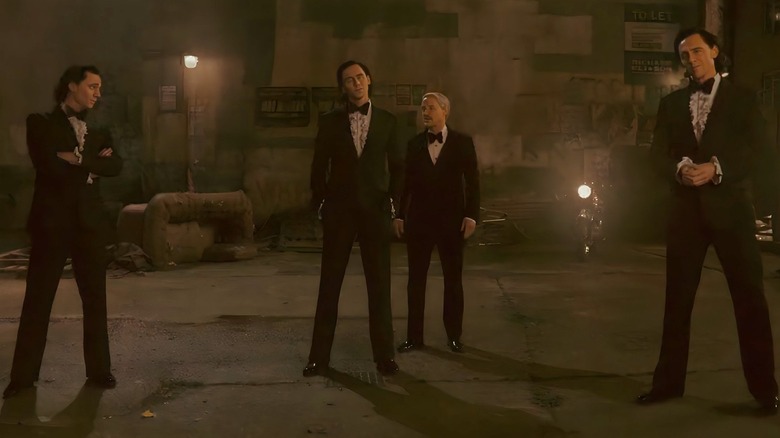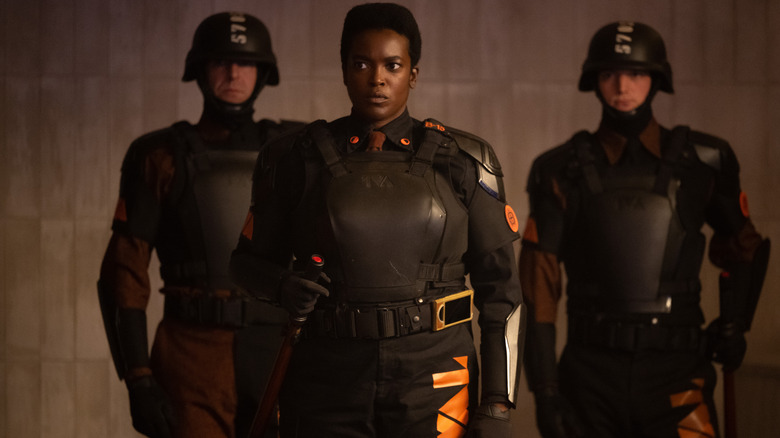What Are Marvel Variants & How Are They Reshaping The MCU In Loki Season 2?
These days, "Marvel Cinematic Universe" is kind of a misnomer. It really should be renamed "Marvel Cinematic Multiverse" because the ever-expanding superhero franchise is diving headfirst, and with rigorous abandon, into the concept of infinite concurrent realities. There's the "main reality," in which the primary events of the MCU take place and which the Time Variance Authority refers to as the Sacred Timeline, but there's also, well, everything else. The TVA calls these alternate realities branching timelines, and they're populated by individuals whom the TVA labels variants.
Variants are individuals who, for whatever reason, exist in a reality where events did not unfold as the Sacred Timeline dictates. Consider how Loki (Tom Hiddleston) becomes a variant in his Disney+ original series: By escaping Asgardian imprisonment for his role in the Battle of New York when the Avengers meddle with time in "Avengers: Endgame," he creates a Nexus Event — a point of notable change to the Sacred Timeline.
In "Loki" Season 2, the TVA is reeling from the revelation that every single one of its members is a memory-wiped and brainwashed variant plucked from somewhere in the Multiverse — it's a lot more difficult to commit genocide when your criteria technically require your own death. And with more branching timelines permitted to exist, the MCU can literally grow forever in literally every direction.
How do infinite branching timelines play out for the MCU?
The thing about variants is that everyone within a universe becomes one if even a solitary individual within that universe makes a decision that strays from the Sacred Timeline. While the TVA considers variants to be catastrophically dangerous, it's not exactly difficult to become a variant when you contextualize how many choices a person makes in a single day. Now imagine the hundreds of potential permutations that could arise from that one person alone just for that day. Now multiply that number by the universe's population, and then multiply it again by the full breadth of time. It's exhausting, isn't it? That's the sandbox the Marvel Cinematic Multiverse is currently playing in.
Other MCU projects, like "Spider-Man: No Way Home," "Doctor Strange in the Multiverse of Madness," and "Ant-Man and the Wasp: Quantumania," all technically cover the topic of variants too, but the eye of this storm rests squarely in "Loki," which continues to serve as the primary source for exploring the infinite possibilities that stem from branching timelines and variants. Hopefully, the TVA shutting down all pruning practices will lead to the characters questioning their actions. Will Mobius (Owen Wilson) seek out his previous life on the timeline? Will Hunter D-90 (Neil Ellice) choose to think for himself? The character implications for the existence of variants are enormous, and if Marvel Studios dedicates the proper emotional weight to them, it can lead to some of the most compelling sequences to ever grace the Sacred Timeline.
Stories only matter when actions have consequences
Ignoring the questionable morality of universal genocide, the fact remains that variants cause narrative problems for the MCU. Stories only matter when actions have consequences, and it's a little difficult to believe in the stakes of any given situation when, just one universe over, things are probably fine and dandy. In this new phase, death potentially means nothing. Oh, Iron Man (Robert Downey Jr.) sacrifices himself to save the world? Just hop a few timelines over and snag a variant of Tony Stark who needs a happier ending. And if Marvel Studios ever feels like reintroducing a character whose actor bid the MCU goodbye? Just dub the new version a variant.
Yes, interesting stories can be told with multiples of the same character — one of the best episodes of "Loki" Season 1 features numerous variant Lokis (who all got amazing character posters) – but variants can quickly bog the narrative down if Marvel Studios leans too heavily into this new facet of the canon. The reason that "Spider-Man: No Way Home" works so well is that audiences collectively never believed that something like that would ever happen, not to mention the fact that it weaves three disparate franchises together. With a precedent set, though? It's just another Tuesday.
But maybe we're overthinking it. Maybe the convoluted "Loki" Season 2 will end in such a way that branching timelines are allowed to exist but left broadly to their own devices. We'll see in a few weeks. "Loki" Season 2 is now streaming on Disney+.


